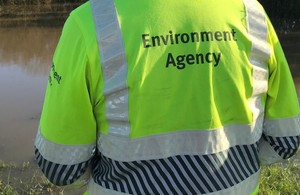Consultation on Yorkshire permit application opens
Egdon Resources UK Limited has applied to the Environment Agency for an environmental permit.

The company has asked for permission to build a temporary wellsite at Weaverthorpe and drill a test borehole to explore for natural gas.
The proposed site is land north of Butt Lane, at Foxholes in Driffield.
Before any drilling or testing can start, the company must have an environmental permit to operate.
The Environment Agency is now seeking views from the local community and interested groups on the permit application.
The consultation is open and runs until 14 January 2026.
The consultation documents can be found on the Environment Agency’s Citizen Space website.
The Environment Agency will host a public drop-in session on 2 December 2025, from 4pm until 7pm at Foxholes Community Hall, YO25 3QW.
Issued by the Environment Agency, environmental permits detail the conditions that an operator is required to meet to ensure its activities minimise the risk of harm to people and the environment.
The company also needs planning permission from North Yorkshire Council the local authority before work can begin.
Regulations protect people and the environment
Kathryn Richardson, area environment manager at the Environment Agency, said:
We will carry out a detailed and rigorous assessment of the permit application.
Our regulatory controls for the onshore oil and gas industry are in place to protect people and the environment.
I’d encourage people to read the consultation documents and attend the drop-in. We welcome comments from the public and interested groups on local environmental factors that people feel are important.
The Environment Agency may only refuse a permit application if it does not meet one or more of the legal requirements under environmental legislation, including if it will have an unacceptable impact on the environment or harm human health.
For anyone who can’t access the Internet or attend the drop-in session, a paper copy of the application will be made available at Foxholes Community Hall, in Foxholes YO25 3QW.
Background
Consultation:
- Responses to the consultation can be made electronically.
- Information on the website explains how you can view the consultation documents and how you can make your comments. We also explain what we can and can’t take into account when deciding on the application.
- Anyone wishing to comment on the proposals is urged to read the documentation online before responding directly on the website or by email pscpublicresponse@environment-agency.gov.uk
- For anyone who can’t access the Internet or attend the drop-in session, a paper copy of the application will be made available at Foxholes Community Hall, in Foxholes YO25 3QW.
- The usual 20 working day consultation has been extended to mid-January to allow extra time due to the Christmas period.
Environment Agency regulation of onshore gas and oil:
- The Environment Agency’s regulatory controls for the onshore oil and gas industry are designed to protect people and the environment. We do not permit activities that pose an unacceptable risk
- Our regulatory process – permitting, inspecting, monitoring and enforcement – is designed to protect our water, land and air, and the people and wildlife that depend on them.
- We will not allow any activity that could pollute water (rivers and streams, surface water, groundwater, drinking water) or any removal of water if it could affect the public water supply or damage the environment.
- We ensure waste material is minimised, stored, and disposed of safely so it doesn’t harm the soil or the wider environment.
- We protect the air by requiring that any waste gas is burnt in a safe and controlled way, and that any emissions are minimised and monitored.
Environmental permits:
- Environmental permits set out strict legal conditions by which an operator must comply in order to protect people and the environment. Should an environmental permit be issued, the Environment Agency has responsibility for enforcing its conditions.
- Our powers include enforcement notices, suspension and revocation of permits, fines and ultimately criminal sanctions, including prosecution.
- We may only refuse a permit if it does not meet one or more of the legal requirements under environmental legislation, including if it will have a significant impact on the environment or harm human health. If all the requirements are met, we are legally required to issue a permit.